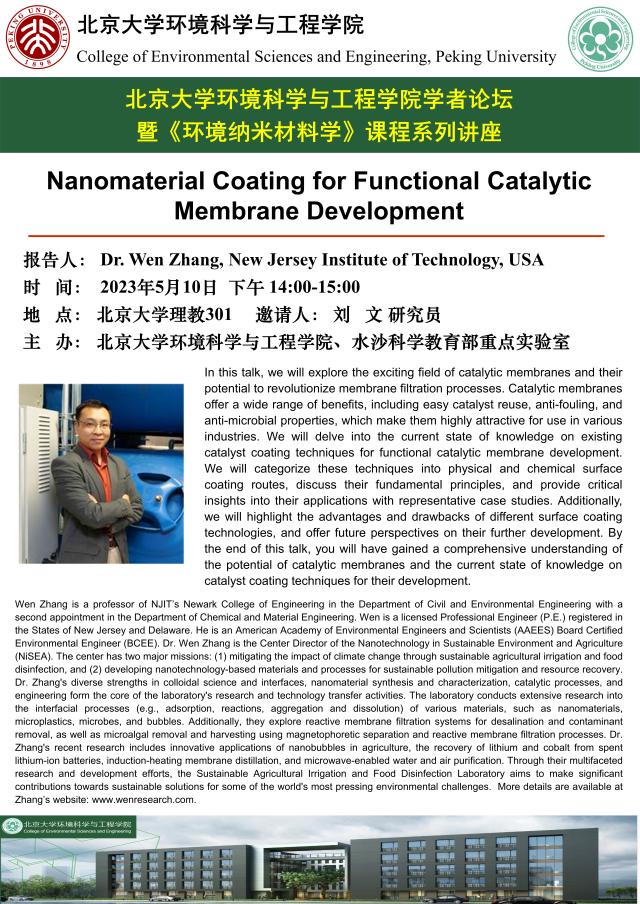Speaker: Dr. Wen Zhang,New Jersey Institute of Technology, USA
Time: 14:00-15:00 p.m., May 10, 2023, GMT+8
Venue: Science Building Room 301
Abstract:
In this talk, we will explore the exciting field of catalytic membranes and theipotential to revolutionize membrane filtration processes. Catalytic membranesoffer a wide range of benefits, including easy catalyst reuse, anti-fouling, andanti-microbial properties, which make them highly attractive for use in variousindustries. We will delve into the current state of knowledge on existingcatalyst coating techniques for functional catalytic membrane developmentWe will categorize these techniques into physical and chemical surfacecoating routes, discuss their fundamental principles, and provide criticainsights into their applications with representative case studies. Additionallywe will highlight the advantages and drawbacks of different surface coatingtechnologies, and offer future perspectives on their further development. Bythe end of this talk, you will have gained a comprehensive understanding ofthe potential of catalytic membranes and the current state of knowledge oncatalyst coating techniques for their development.
Biography:
Wen Zhang is a professore 0f NJIT's Newark College of Civil and Environmental Engtneering with a second appointment in the Department or Chemical and Material Engineering. Wen is a licensed Professional Engineer (P.E) registered inthe States of New Jerse and Detaware. He is an American Academy of Environmental Engineers and Sclentists (AAEES) Board Certified Envronmental Engineer (BCEED).Dr. Wen Zhang is the Center Director of the Nanotechnology in Sustainable Environment and Agriculture (NiSEA). The center has two major missions: (1) mitigating the imeact of climate change through sustainable agricultural irrigation and food disinfection, and (2) developing nanotechnology-based materials and processes for sustainable pollution mitigation and resource recovery. Zhangs diverse strengths in colloidal science interfaces, nanomaterial synthesis and characerization, catalytic processe, and the engineering from the core of the laboratory's research and technology transfer activities. The laboratory conducts extensive research into the interfacial processes (e.g., adsorption, reactions, aggregation and dissolution) of various materials, such as nanomaterials, microplastics, microbes, and bubbles. Additionally, they explore reactive membrane filtration systems for desalination and contaminant. Zhang's recent research includes inmovative applications of nanobubbles in agriculture, the recovery of lithium and cobalt from spent lithium-ion batteries, induction-heating membrane distillation, and microwave-enabled water and air purification. Through their multifaceted research and development efforts, the Sustainable Agricultural irrigation and Food Disinfection Laboratory aims to make significant contributions towards sustainable solutions for some of the world's most pressing environmental challenges. More details are available at Zhang's website: www.wenresearch.com
Source: College of Environmental Sciences and Engineering
